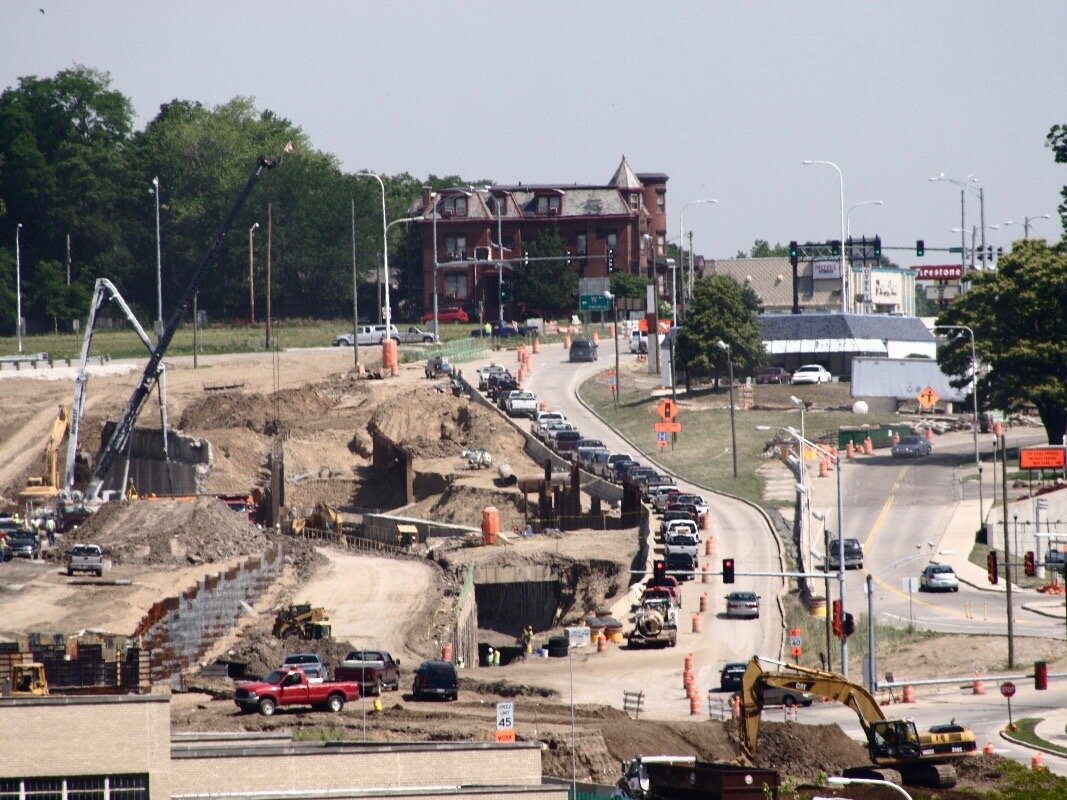Responsible Bidder Ordinances pay for selves
ILEPI study finds imposing basic standards on public projects increases bids without hiking costs
A public construction project along Interstate 74 in Peoria. (Wikimedia Commons/Robert Lawton)
By Ted Cox
A new study finds that imposing basic standards on local public projects increases the number of bids and improves the ultimate quality of the work, without raising costs.
The Illinois Economic Policy Institute released “The Impact of Responsible Bidder Ordinances on Bid Competition and Public Construction Costs: Evidence from Illinois and Indiana, 2018-2019” on Tuesday. It examined 1,200 recent public works projects in Illinois and Indiana with an eye toward how they differed when basic regulations and standards were imposed.
The study compares RBOs to prevailing-wage laws, which establish a basic wage for public construction workers. A previous ILEPI study earlier this year found widespread benefits to prevailing-wage laws. The new study addresses how Indiana repealed its prevailing-wage law five years ago, while the Illinois law “does not explicitly define basic contractor standards to qualify as a responsible bidder on locally financed projects,” according to a news release touting the new study. RBOs therefore tend to be local attempts to impose generally recognized standards, not just for wages, but also for “apprenticeship training programs, insurance policies, and compliance with all local, state, and federal laws.”
“The purpose of an RBO is to promote minimum standards of competence, quality, and apprenticeship investment on taxpayer-funded construction projects where the lowest bid wins,” said study author and ILEPI Policy Director Frank Manzo IV. “An RBO is a vital policy tool for states, cities, and local contracting bodies that want to prevent contractors with poor track records on performance, safety, and workforce development from gaining an unfair advantage in the competitive bid process.”
One of the immediate benefits of RBOs, the study found, is that they increase the number of bids by an average of 8 percent, no doubt because the bidding system is perceived to be more fair and less likely to be abused by rogue contractors skirting regulations and undercutting more conscientious contractors.
As a result, the study found, RBOs “increase the market share of union contractors by as much as 12 percentage points — suggesting that nonunion contractors are less likely to contribute to apprenticeship training programs and less likely to comply with state, local, and federal laws.”
Most impressive was that the study found that following these regulations and general policies did not hike the costs. The study examined 1,200 projects in Illinois and Indiana throughout 2018 and on through May of 2019, with 265 of them covered by RBOs. Building projects and state Department of Transportation and tollway projects were actually slightly cheaper for those covered by RBOs, and while they were slightly more expensive for local highway projects it was not by a statistically significant amount. Building projects under RBOs cost on average just under $2 million, while those not covered averaged slightly above $2 million, while local heavy and highly projects were both in the $700,000 range and state highway projects were just above and below $2.8 million, to the benefit of those covered by RBOs.
“The overwhelming consensus of respected economists is that minimum standards reduce the taxpayers’ risk of contractor nonperformance without increasing costs — while strengthening both the apprenticeship system and the local economy,” Manzo said.
The study concludes that RBOs “have no statistical impact on total construction costs because they boost the share of construction performed by highly trained and skilled construction workers.”
“Without RBOs, many contractors have an incentive to forgo long-term investments in workforce training in order to win short-term bids,” Manzo concluded. “Prior research — particularly in states that have repealed prevailing-wage laws — shows how this approach undermines the industry’s need to attract and retain skilled workers, degrades the productivity of the workforce, and fails to save money. By promoting apprenticeship investments and minimum performance standards, RBO projects are not only coming in at the same or lower cost, they are producing more bid competition. This is better value both for the construction industry and for taxpayers, especially as states and local government look to invest in public infrastructure to rebuild economies in a post-COVID-19 world.”
“Responsible Bidder Ordinances provide great value on taxpayer-funded projects,” the study states. “RBOs may be especially effective in states that have repealed or weakened prevailing-wage laws by minimizing the negative economic, safety, and workforce-development consequences that have been associated with a lack of standards on taxpayer-funded construction projects. In fact, RBOs drive down costs by encouraging more competition while improving quality by promoting registered apprenticeship programs. Consequently, RBOs may become particularly important as states and local government invest in infrastructure to rebuild economies in a post-COVID-19 world. Ultimately, Responsible Bidder Ordinances are an effective policy tool that can be used to uphold local construction standards without raising costs for taxpayers.”

